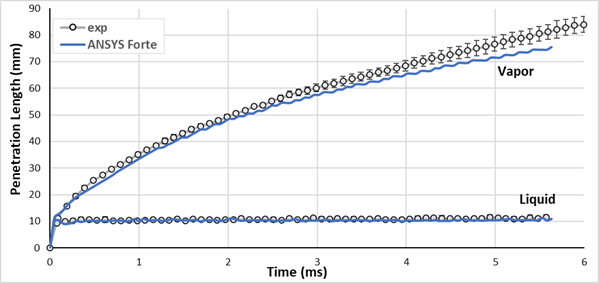VMFRT002
VMFRT002
Engine Combustion Network Nonreacting Flow Case - bklraAL4
Overview
| Reference | Retrieved from Engine Combustion Network (ECN) data search utility: https://ecn.sandia.gov/ecn-data-search/ Accessed on April 7,
2020. Find relevant data and information by choosing the parameters highlighted in gray below on the ECN data search utility. |
 | |
| Solver | Ansys Forte |
| Physics/Models | Engine Combustion Network (ECN) Nonreacting Flow Case bklraAL4 |
| Input Files | P_50MPa_NR.ftsim
|
| Project Files | Link to Project Files Download Page |
Test Case
This test recreates the Engine Combustion Network (ECN) Spray A target case characterized by high-pressure liquid fuel injection in conditions relevant to diesel engines. In this case, the combustion chamber has a cubical shape (length = 10.8 cm), the oxygen content is zero, and the difference between the fuel injector pressure and ambient gas pressure is 50 MPa. The fuel entering the combustion chamber through the spray injector is n-dodecane (nC12). The model includes two refined regions of respectively 2 mm and 1 mm around the jet. The table below lists the setup parameters for the experiment and simulation. Results are compared against the experimental data from the ECN data search utility, 2019.
Additional test details can be found on the ECN web site. The experimental data for the vapor and liquid penetration lengths can be found in the form of text files on the ECN site at the following links:
The modeling predictions for vapor and liquid penetration lengths are compared with the experimental results including error bars in Figure 203: Vapor and liquid penetration length.
| Test case properties | |||||||||
|---|---|---|---|---|---|---|---|---|---|
| Pinj | Minj | Durationinj | Vamb | ρamb | Compositionamb | Pamb | Tamb | Tfuel | Dnozzle |
| 50 MPa | 7.4 mg | 5.65 ms | 20 cm/s | 22.8 kg/m3 |
N2 = 89.71% CO2 = 6.52% H2O = 3.77% | 6.07 MPa | 900 K | 373 K | 0.084 mm |
| Simulation Settings | |||||||||
| RTdist | vinj profile | Spray initialization model | L/D | R/D | SAM on ∇T∇Vel∇Y*[a] | Turbulence model | Mesh sizeMAX | dtinitial | |
| 2.2 | Flat | Nozzle flow | 11.9 | 0.238 | 0.5 mm | RANS RNG-kϵ | 4 mm | 1E-7 s | |
[a] Y*=Fuel Vapor Mass Fraction



